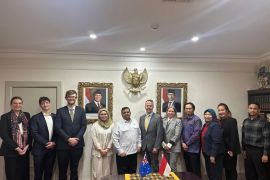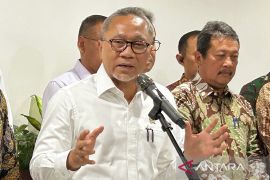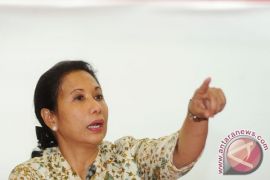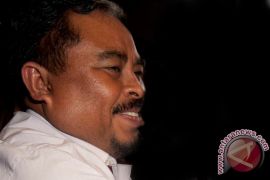According to the Indonesian Buffalo and Cow Breeders Association (PPSKI), the MKs decision over the judicial review of Law No. 41 of 2014 on the amendment of Law No.18 of 2009 on animal husbandry and animal health will end the controversies.
The government is planning to import buffalo meat from India in an effort to encourage competition in meat sales and bring down the skyrocketing domestic beef prices.
However, several quarters are opposed to the governments plan as India is believed to be a nation that is not yet free from cattle foot-and-mouth disease, apart from the consumption culture of Indonesians, who are not accustomed to eating buffalo meat.
Hence, PPSKI Chairman Teguh Boediyana stated that his organization had called on the MK to soon issue a decision on the judicial review of Article 36 of Law No.41 of 2014 on the amendment of Law No.18 of 2009 on animal husbandry and animal health.
"The article to be reviewed concerns provisions allowing the importation of animals or animal products not based on a country but a zone," Teguh noted.
Animal products could be imported from a zone free from an animal disease.
Teguh pointed out that the request for the judicial review of the article was registered by the MK on October 16, 2015. The session to hear the experts or witnesses from the petitioners, the government, and the House of Representatives was held on May 12, 2016.
"We are now awaiting the MKs verdict on the judicial review case, with registration number 129/PUU-XIII/2015," he remarked.
A verdict of the MK will end the controversies over the import of animals and animal products, including on the governments plan to import buffalo meat to help lower domestic beef prices.
Controversies arose as the government has planned to import buffalo meat from a country whose status is not yet free from contagious diseases, such as foot-and-mouth disease.
Teguh affirmed that the decision taken by the MK on the judicial review of article 36 of the law will put an end to the controversies.
"We hope the pros and cons on the importation of meat would be evaluated soon, so that the government could focus on realizing President Joko Widodos plan to transform the country into a beef self-reliant nation by 2026," he emphasized.
The Agriculture Ministry had earlier ensured that the buffalo meat to be imported from India, which is considered to not be free from foot-and-mouth disease, was a safe product.
Veterinarian Society Health Director of the Agriculture Ministry Sri Mukartini noted that the slaughter of cows is banned in India, so buffalos are slaughtered, including those exported to other countries.
"Those categorized as safe products include boneless meat. As long as the meat is classified as a safe product, the possibility of it containing live virus is small," Mukartini pointed out.
Animal Health Director of the Agriculture Ministry I Ketut Darmita stated that the meat from India can be imported as long as it obtained the expert commissions recommendation based on the World Organization for Animal Health reference.
Darmita stated that before importing buffalo meat from India, the government will send a team of experts to the country to directly review the slaughterhouses and conduct an analysis of all aspects related to technical and economic risks.
"We will seek guarantees on the food security and the halal aspect (allowed based on the Islamic law) of the slaughtering process at the abattoirs," Darmita added.
President Jokowi has stressed that the plan to import buffalo meat is aimed at shoring up the meat supply at home and provide consumers with alternative meat. The government will import not only buffalo meat and innards but also frozen beef.
If there are abundant supplies in the market, consumers will be able to buy cheaper meat or viscera as the price of beef currently is still over Rp120 thousand per kg. That is because business players were controlling the price. The imports will be a short-term solution to bring down the soaring beef prices.
In the long-run, the government will do its best to achieve its target to become meat-self reliant. However, according to Jokowi, self-reliance could be achieved in a span of nine to ten years.
"Frozen (cow) sperms must be procured. We have to have at least three million calves every year. So, female cows should be prepared well to achieve self-reliance," Jokowi was quoted as saying by detikfinace news portal on Thursday (July 14).
He underlined that he could not understand why the price of beef in Indonesia was so high. In Singapore and Malaysia, the prices of beef and buffalo meat were lower at Rp60 thousand and Rp52 thousand per kg, respectively. "Other countries can sell meat at a lower price, then why cant we?" Jokowi questioned.
Legislator Firman Soebagyo of House Commission IV on agriculture of the House of Representatives (DPR) stated on Saturday (July 16) that he disagreed with the governments plan to import buffalo meat from India.
"If the government is really willing to import buffalo meat, it should meet the existing regulatory mechanism. After all, the Indonesian people are not used to consuming buffalo meat," Firman Soebagyo emphasized in a written statement in Jakarta on Saturday.
The PPSKI has also asked the government to postpone its plan to import buffalo meat from India because that country is still not free from foot-and-mouth disease. Teguh Boediyana said that his organization has sent a letter to Coordinating Minister for Economic Affairs Darmin Nasution and Trade Minister Thomas Lembong, asking them to postpone plans to import buffalo meat from India.
"We, the executive of the PPSKI, implore that the government should put off its plan to buy buffalo meat, or at least delay the distribution of such meat to the market," he added.
(A014/INE/O001)
(T.A014/A/KR-BSR/O001) 20-07-2016 12:18:33
Reporter: Andi Abdussalam
Editor: Fardah Assegaf
Copyright © ANTARA 2016










